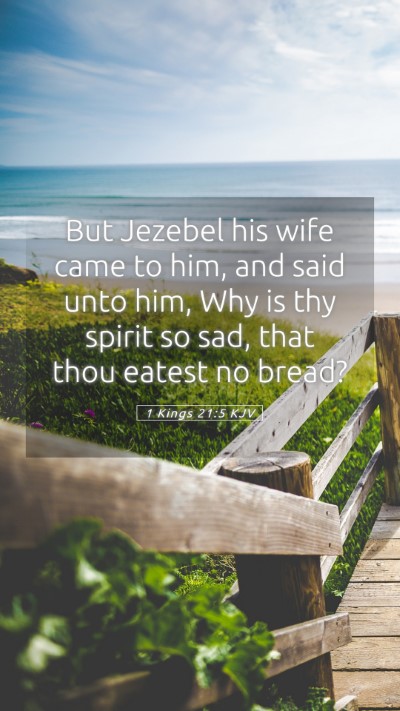Understanding 1 Kings 21:5
The passage of 1 Kings 21:5 details a critical moment in the story of Ahab and Naboth, illustrating themes of covetousness and moral decay within leadership. The verse reads:
"But Jezebel his wife came to him and said to him, 'Why is your spirit so sad, that you eat no food?'"
Bible Verse Meanings and Interpretations
This verse conveys the emotional state of King Ahab. He is in deep distress over Naboth's refusal to sell his vineyard, which Ahab desires for himself. The sadness that Ahab experiences points toward his failure to reconcile his desires with moral righteousness.
Insights from Public Domain Commentaries
-
Matthew Henry's Commentary:
Henry notes that Ahab's sorrow indicates how earthly desires can dominate one's spirit. His unkingly behavior is contrasted with divine commandments, which he neglects in pursuit of personal gain. Ahab's distress serves as a reminder of the spiritual emptiness that can accompany unchecked desires.
-
Albert Barnes' Notes:
Barnes elaborates on the character of Jezebel, explaining how she represents the corrupt tendencies within Ahab's reign. Jezebel’s query highlights her lack of understanding or sympathy for spiritual matters, focusing instead on Ahab's physical appetite and emotional state, showcasing the moral decline in their leadership.
-
Adam Clarke's Commentary:
Clarke emphasizes the manipulative nature of Jezebel, who responds to Ahab’s sorrow not with understanding but with pragmatism. Her question underscores a lack of noble aspiration, further emphasizing the role of ambition and greed in human relationships and governance.
Biblical Exegesis
An examination of this verse reveals deeper implications regarding authority and desire. Ahab, king of Israel, is expected to conduct himself with fairness and justice, yet his despair over a simple vineyard indicates a significant moral failure. Jezebel’s manipulative response to his sadness serves as a catalyst for the immoral actions that follow, ultimately resulting in Naboth's tragic demise.
Contextual Understanding of the Scripture
The context of 1 Kings is critical in understanding Ahab's character. In this narrative, Ahab is portrayed not just as a ruler but as a man besieged by his ambitions and desires. The actions of Jezebel later intensify this moral conflict. Their partnership illustrates the dangers of allowing corrupt influences to steer personal and public ethics.
Significance of the Verse
The significance of 1 Kings 21:5 extends beyond its immediate narrative. It prompts modern readers to evaluate their own desires against the backdrop of ethical living and accountability. It becomes apparent that unchecked ambition can lead to personal and communal tragedy.
Applications for Daily Life
For today’s believer, this verse serves as both a warning and a beacon. It encourages introspection about desires—are they leading toward fulfillment or destruction? Moreover, it poses important questions regarding the influences exerted on our decisions and how we choose to react to dissatisfaction.
Related Bible Cross References
- Exodus 20:17 - The commandment against coveting.
- Proverbs 14:30 - The effects of envy and desire on the heart.
- James 4:2 - The source of conflicts stemming from unmet desires.
Conclusion
1 Kings 21:5 serves as a profound reminder of the dangers of letting earthly desires overshadow our moral obligations. The interplay between Ahab and Jezebel illustrates how unchecked ambition can lead to calamity, and it prompts readers to seek wisdom and integrity in their own lives.
For further exploration of these themes, readers are encouraged to engage with various Bible study resources, including commentaries, study guides, and group discussions that deepen the understanding of such pivotal passages.


